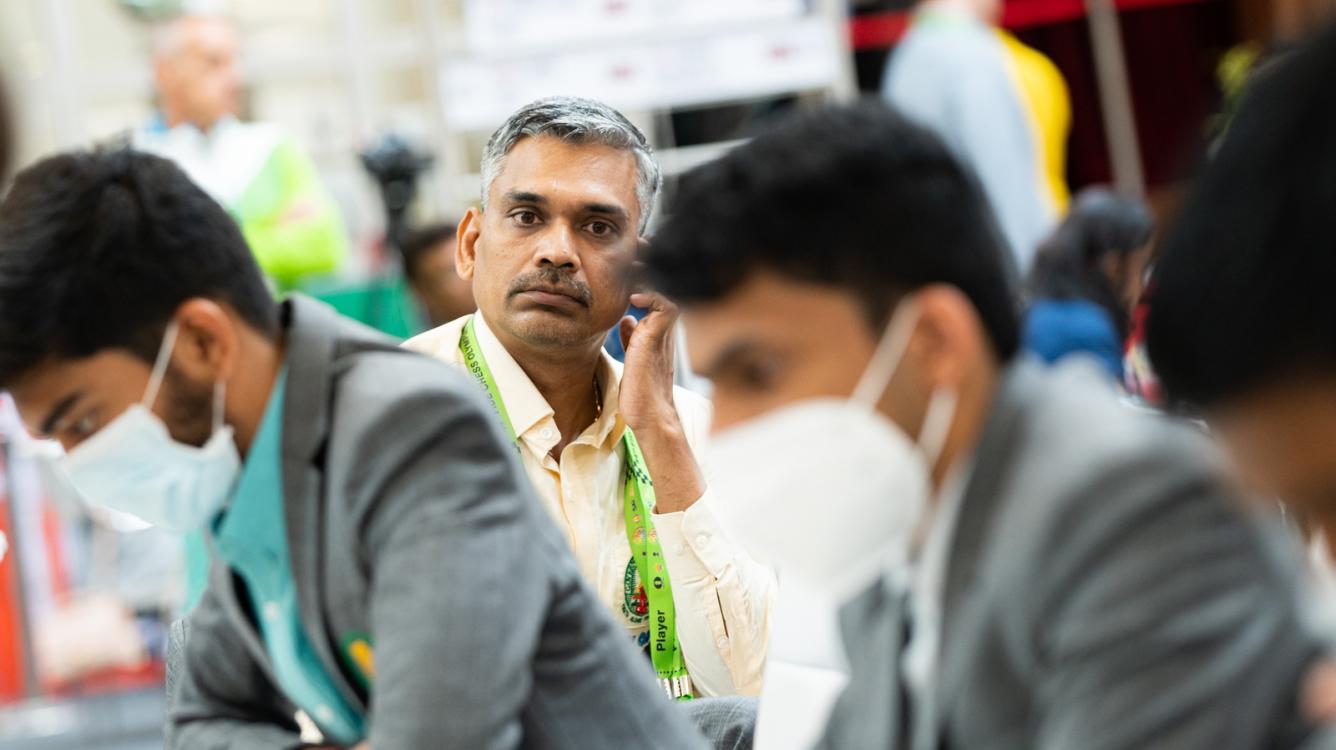
Interview: GM Ramesh On Coaching India 2 At Chess Olympiad, Winning Bronze
GM R.B. Ramesh is a name recognized globally in the chess community, thanks to his reputation as a chess trainer. Over the years, he has helped many chess players attain titles and secure medals at International levels. He is the only Indian coach to have won two bronze medals at the Chess Olympiad. In an interview with Chess.com India, the Indian coach shared his experiences of working with the India 2 team and shed light on his coaching journey so far.
Ramesh started his coaching career quite early and there's a backstory associated with it.
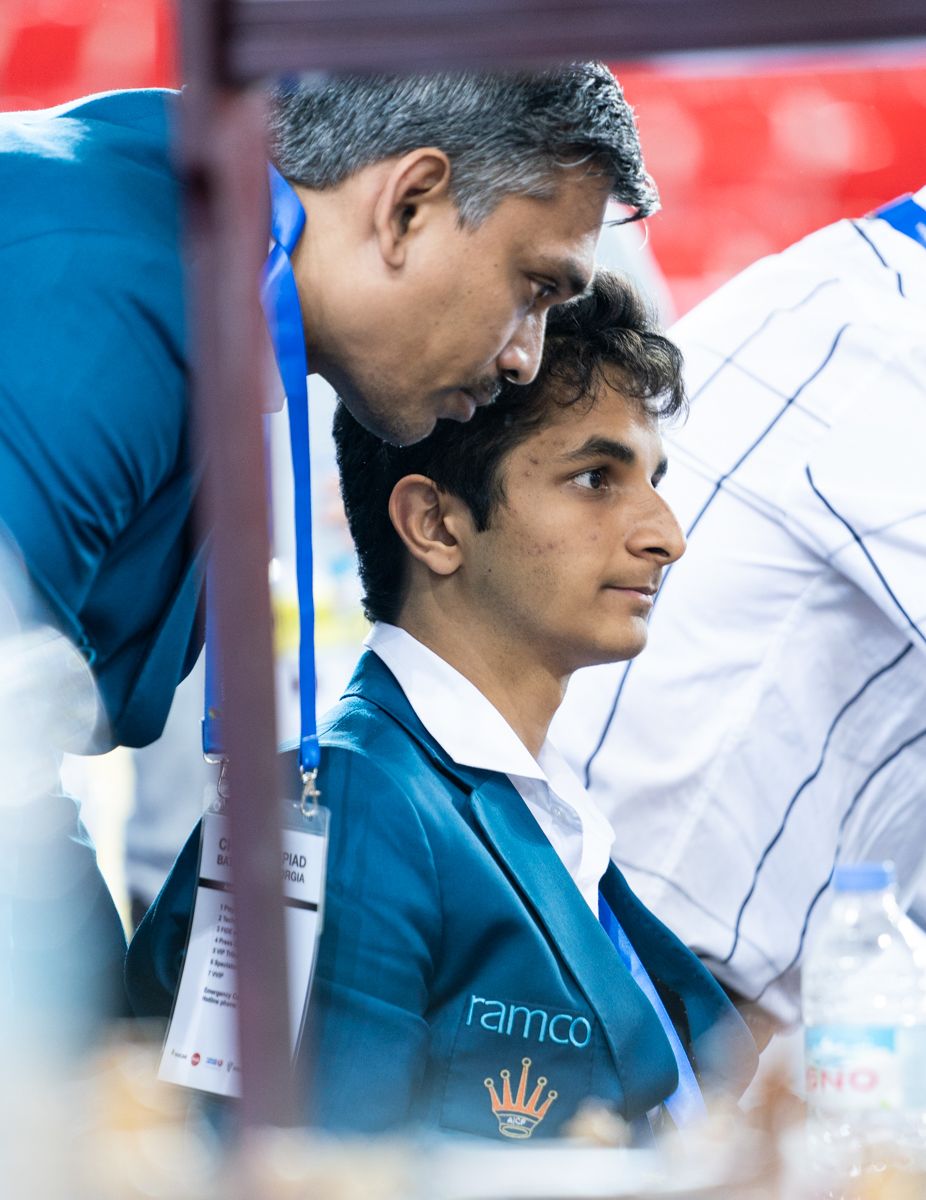
"I started my coaching career in 1998. I was 22 years old and was invited by the Indian chess federation. Back then, Mr. Ummer Koya was the secretary and he asked me if I would be interested to go as a coach of the Indian junior team to the Asian Junior Chess Championship in Iran. Tejas Bakre and Vijayalakshmi Subbaraman won the boys' and girls' title respectively—not because of my training or anything, but because I was simply there. That was the first time I was given the role of a trainer.
"Immediately after returning from Iran, I was asked by Aarthie Ramaswamy's parents if I would be interested to work with her. Back then, the concept of [a] coach was still not there—it was very informal. Playing games, showing some positions, and so on. Thus, I started working with her. Next year, she won the World U-18 Championship in Spain. She was seeded 13th and not a favorite to win." After a great result by Aarthie, Ramesh started getting many coaching offers from other players, and that marked the beginning of his coaching career. The decision to turn into a professional coach came a few years later.
"It was not a one-day decision. Some of my students started becoming national champions, international masters, and grandmasters in a short period of time. It was becoming clearer to me that I was becoming more successful as a trainer than a player. Also, I enjoyed training more than playing. Playing was becoming more stressful and I started devoting more time to working with other players.
"In 2008, I quit my job with Indian Oil Corporation and also retired from playing chess at the age of 32. We [R.B. Ramesh and his wife Aarthie Ramaswamy] started Chess Gurukul in Chennai."

"I loved teaching chess to young children. The experience is close to my heart. I wanted to lay a strong foundation in the minds of young children. The journey of becoming a better player should be enjoyable. Wanted to inculcate that the students have an important role to play. They should not outsource their learning to trainers and think others will make them a better player. It should be clear that they should come up with their own efforts and become responsible."
I loved teaching chess to young children. The experience is close to my heart.
—R.B. Ramesh
When asked what he loved a lot about the coaching process: "Generally, it is an honor and privilege and a great opportunity to be able to influence and be a part of an individual's chess journey over the years and mold them in a proper way."
Working With Praggnanandhaa
Ramesh started working with GM R Praggnanandhaa when the prodigy was close to being 8 years old. He was already a national U-7 and world U-8 champion. At that time, his sister, IM Vaishali R, was stronger and she was the world U-12 girls' champion.

"From the very first day, it was clear that Pragg and Vaishali were talented in chess. What struck me was their down-to-earth, humble nature. Success did not get into their head. I have seen a lot of children take success to their head. They were willing to work extremely hard. They did not come up with a mindset like, 'Oh, Ramesh is a good coach and he will make me a world champion.' Many children come to me like that. But, they knew their role. They knew that they were the heroes of their own journey and whether they become successful or not is within their own hard work and determination.
"Many students come to me and say that they work 8 hours a day, or 10 hours a day. They think they are working hard. But, I feel that hard work is not just about the amount of hours we invest in chess, but also about the quality of the time we invest and our involvement in the efforts. Pragg and Vaishali invest a lot of themselves into the game.
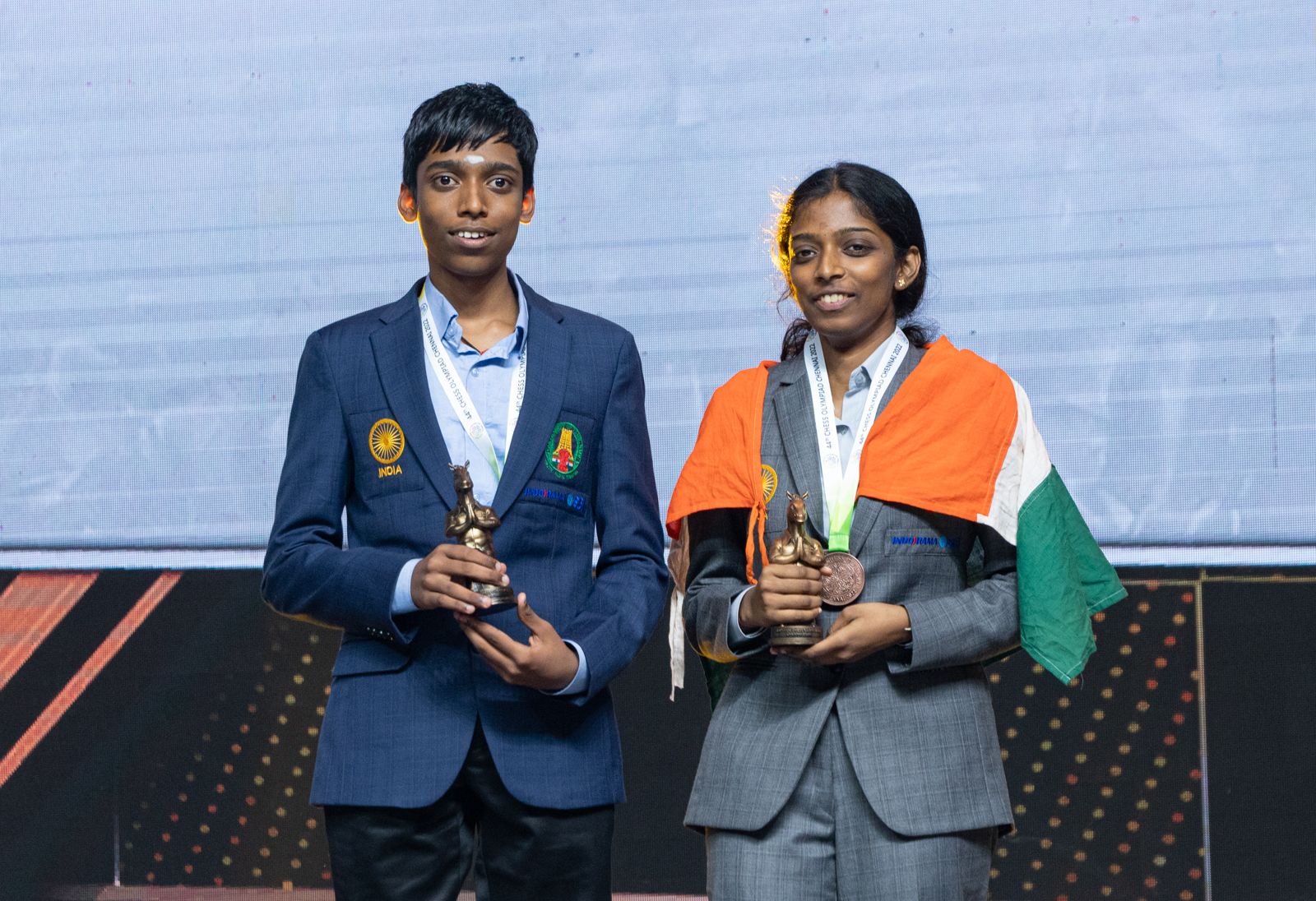
"Pragg doesn't get too sad about losses. He has the ability to bounce back from difficult situations and that is something I admire."
When asked how Pragg developed the skill, Ramesh shared that he pays a lot of attention to the mental aspect of the sport. "I am very popular among my students for my advice and long lectures." He emphasizes focusing on the learnings involved and aiming toward progress without losing sight of the eventual, long-term goals.

Speaking of the changing times, Ramesh shared that a lot has changed in the last five years. "During the pandemic, all the coaching assignments shifted online. The number of students increased as the ability to reach a lot of students increased, but I also felt that the quality was dropping drastically. The interaction with the student wasn't personal and it was not possible to be effective as a trainer online when compared to training in person. I feel that I'm more effective as a trainer in-person than online. "The players are growing strong, especially Praggnanandhaa and GM Aravindh Chithambaram with whom I have been working for many years. The players require my time and attention and there are younger kids too. So, the juggling between many students has been tough.
"Coaching is an evolving process. We are never the same as individuals, we keep changing for better or worse. After working for a couple of decades as a trainer, I feel that the role of psychology has been drastically underestimated by trainers around the world. I want to focus more on that along with the technical aspects of the game. If something is preventing an individual from learning things, those issues need to be addressed."
The Selection Process Of India 2
In accordance with the regulations, the host nation gets to field an additional team in the Open and Women's sections. Thus, India fielded a second team in each event. The All India Chess Federation laid out clear rules on how they would select the players for the team. When deciding the team, the average rating of three months was taken to select the five players.
"When I was in Reykjavik with Pragg for the Reykjavik Open, I was approached by AICF to be the coach of the second team. I readily agreed!"
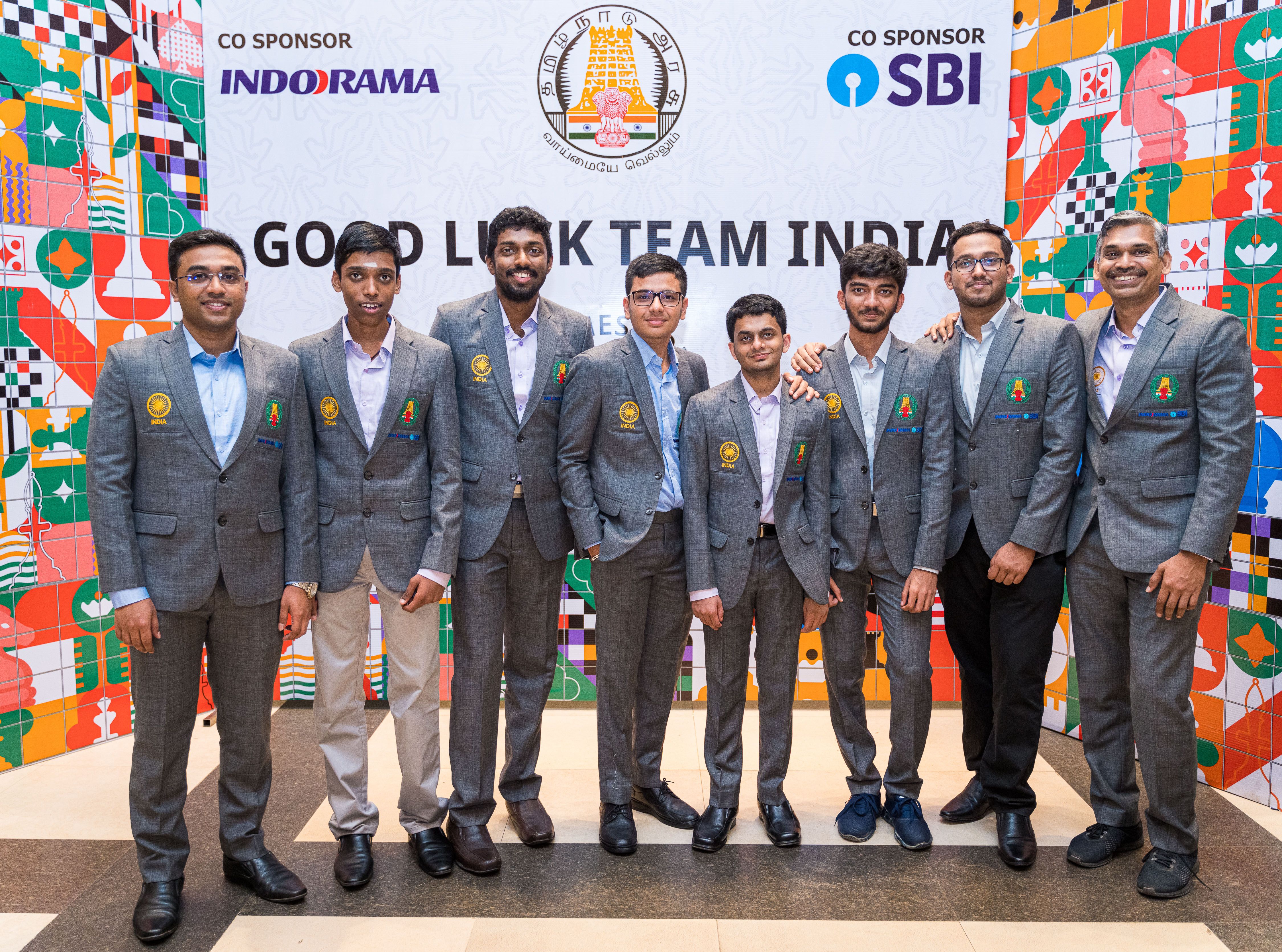
In response to Ivan Sokolov's comment regarding Indian teams, Ramesh shared his thoughts: "I try not to give my opinions on issues where I have no inside knowledge. I feel that it is better not to give an opinion on hearsay. It is not like an individual is choosing the Indian team. The rules are well laid out. Different methods of selection have been tried over the years. For this event, the AICF decided that the top five rated players of the country will represent India at the Chess Olympiad as the rating is the reflection of the players' strength at that point of time. Three months rating average was taken into consideration before the Olympiad to choose the team.
"It is very important that the rules are in place so that the politics don't take over on the crucial aspects, like who will represent the country. So, well laid out, transparent rules are important. I'm proud that AICF has such transparent rules in place. The second Indian team came into the picture since we were the hosting nation of the event and the second team was also chosen based on the same parameters. Subsequently, when the third team came into the picture, the same process was followed.
"I think it is very harmful to discuss such events just for the sake of the discussions. If such discussions are to take place, they should be done with the long-term interests of the game and the country concerned. The discussions can be taken to the authorities and discussed. If better rules can be framed, definitely—I am all for it."

Coaching India 2
"There were two camps in Chennai. Praggnanandhaa, GM Raunak Sadhwani, and GM Baskaran Adhiban attended the first camp. GM Nihal Sarin joined us for the second camp. GM Gukesh D could not join both the camps as he was having some other commitments. I could not get to know Gukesh before the event. In [the] case of Nihal, I started knowing him through the camp.
Happy Birthday @arjunkalyan555 ! Officially ending the teens entering youth! @rpragchess @sadhwani2005 @Stany0122 @SwapChess pic.twitter.com/vBYHhFgYOP
— Ramesh RB (@Rameshchess) June 16, 2022
"We worked on calculations and the psychological aspects in the first camp. Raunak was good with calculations but was relying more on intuition than going into the details. I felt that a difference could be made in Raunak's overall strength.
"It makes sense to rely on intuition in complex positions where it is not possible to calculate or when you are short of time. When you have time on the clock and when the position is reasonably within your limits of analytical abilities, it makes sense to go into the details.
"Nihal and Adhiban had some kind of minor issues. Nihal is an extremely strong player, but his rating had been stagnating for the last year. He also had a tendency to make draws against lower-rated players. Adhiban had dropped from 2700 to 2598 in the last few years and he was also going through a tough phase. As a trainer, it was an interesting challenge and an opportunity to make a difference in the lives of the players who are trying to make a comeback.
As a trainer, it was an interesting challenge and an opportunity to make a difference in the lives of the players who are trying to make a comeback.
—R.B. Ramesh
"Prior to our first camp, I had spoken to Adhiban at the Reykjavik Open while he was having a tough time in the event. I asked him to rethink and rework his priorities and commitments. During the camp, I was surprised when he said that he had stopped using social media. It was heartening to know that he is willing to make some sacrifices in his life for his chess improvement. I'm always happy to work with such players who are willing to change themselves and get rid of their bad habits. I was very happy with both the camps, but the players will give better feedback!"

Ramesh summarised the critical aspects of the players as follows:
- Gukesh: Self-confidence, daring play, risky approach, narrow opening repertoire, defends well in tough positions, and interesting time management.
- Nihal: Very steady and solid, not a broad opening repertoire, dependable, not much risk-taking, interesting time management.
- Pragg: Can play any position, has universal style, broad repertoire, working on areas of concern.
- Raunak: Solid repertoire with Black [Berlin], can be daring with White [had wins against Dominguez and Nisipeanu], can be very aggressive [which suits his style better than the Berlin he plays], very emotional [if he gains better control over handling emotions, he can go really high very soon]
- Adhiban: Is in his second innings, trying to come back, malleable to change, broad repertoire, and very optimistic.
Routine During The Event
"First of all, Gukesh was working on his own throughout the event. I am not sure about his schedule. He wanted his own privacy, which we all wanted to respect. As a team, he contributed a lot with all subsequent wins on the top board. Initially, I had some apprehensions because he did not have much experience at the 2700+ level. So, we were not sure how it would turn out. But, he took responsibility. He said: 'I would prefer to play on the top board.' He showed the world that he can handle all levels of players, defeating GM Fabiano Caruana. He deservingly got the board prize (gold) on the top board. I'm very happy for him!

"We requested the hotel management to give us more tables in the room. All the other players assembled in our room from 9:30 a.m. to 10 a.m. Special mention should be made to GM Stany G.A. and GM Arjun Kalyan who worked really hard during the camps and the tournament. Once the board order was known, we used to discuss the possible openings on every board and divide the work. In addition to that, whoever was not playing on that day would also join and help us in preparations. Thus, we had four helpers helping four players so that a lot of ground could be covered. We ensured that everyone was well prepared when it came to the opening stage of the game."
Ramesh shared that Nihal and Raunak had tendencies to sleep very late, wake up late, and skip breakfast. They had been playing a lot of chess at night, winning a lot of online tournaments in the process, but this event needed a different kind of routine. Considering the event schedule, especially the last round, he felt that a change here could do the team a lot of good. He advised them both to slowly change their sleeping cycle during the camp so that they are fresh to go for the games.
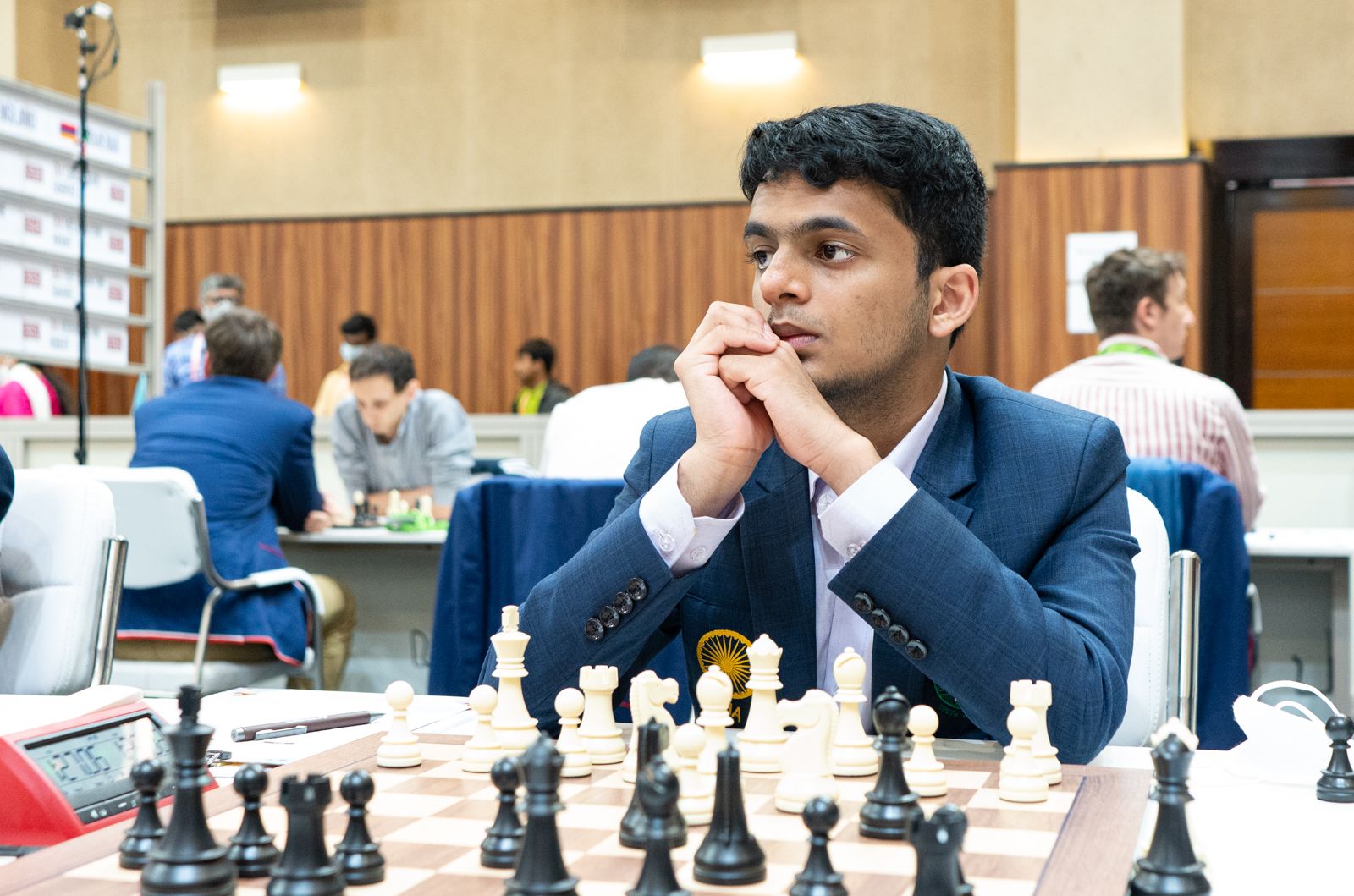
Elaborating on the topic, he added: "It is to their credit that they both made the changes even during the camp. Initially, Nihal was going to bed at 3 or 4 a.m., but gradually made the change and also started coming to breakfast. Really happy to see that it was Nihal and Raunak who won their respective games with the white pieces in the final round that started at 10 a.m. in the morning."

Ramesh believed that team bonding was of utmost importance. "Everyone in the team was very close to each other and were trusting each other. The players also used to play table tennis after their games. We used to have dinner together and would then have a team meeting to decide the board order once the pairings were out at night."
Prior to the event, Ramesh felt that the team had a good chance of earning a medal but wasn't certain about the color. "It is not like if one player plays well we will take the gold. It has to be a collective effort. Some super-human effort like what Gukesh did, but that alone will not carry the team. Everyone has to contribute and play to their respective goals. I wouldn't say that we knew we were going to take gold. That's probably wishful thinking. But, the players had been performing well and if everyone is able to raise their level, a medal was definitely possible and that's what happened. The players raised their level so much that we came very close to winning gold."
Talking about what kept him going throughout the event, Ramesh revealed that he used to go to the gym in the mornings and generally made time to meditate.

"I tried to remain calm during the event. It helps the players that there is someone for them throughout the event. It is a psychological thing. These are young players and they don't have much experience of playing in team events. It is important that we don't get carried away by what is happening on the other boards. This is also something we had discussed. If someone is in trouble on a certain board, you don't have to become desperate and create a mess on your own board. It will just raise the anxiety levels of everyone! My advice to the players was to just focus on their own games."
The Loss Against Armenia And Gukesh's Loss Against Abdusattarov
"The loss against Armenia was unexpected as we had disasters on the third and fourth board. It was tough, but we had sufficient time to recover as we had a few more rounds to go. We made good use of those rounds to recover our form and get our confidence back. Had it happened towards the end, we would have had lesser opportunities to come back. We told ourselves: we can either give up hope and buckle down under pressure, which is the easiest thing to do, or raise our level and become more responsible. I told the players that it is our choice and we can choose not to give up and they all rose back bravely. I'm very proud of them!"
I told the players that it is our choice and we can choose not to give up and they all rose back bravely.
—R.B. Ramesh
Ramesh termed the result of the critical game between Gukesh and GM Nodirbek Abdusattarov as painful. "A draw could have given us a lead over others. We would have been ahead of Uzbekistan and we also had a good tiebreak against Armenia. We were all upset, but we had the next round in the morning. There was no time to grieve and [it] was crucial for us to hit back strongly to have any chances for a medal.
"The game ended late and I and Gukesh were the last to leave. On our way back, Gukesh said that he wants to play the final round. I also wanted him to play, as he was playing well except for the few moves in that round. The board order was decided very quickly. We wanted Raunak to play as White in the final round on the fourth board. After deciding our opening plans, we divided our work. GMs Stany and Kalyan worked until 4:30 a.m. on the next day and completed the preparation so that the material was ready when the players woke up."
Viswanathan Anand's Support
"After the draw against Uzbekistan, GM Viswanathan Anand informed us that he might drop in. He first met Gukesh and had a talk with him. Later, we all met him and had a brief discussion. Everyone on the team was very motivated after meeting Anand!
"It was very important that we do not panic. Germany was seeded higher than us. We knew that it was not going to be easy. But, if we played well, we knew we could beat them.
My son told us that if team X or Y loses and we win, then we can win X or Y medal. My wife advised that we should not wish for a loss for other teams; we should focus on winning our match and accept the outcome whatever it is... Happy to have such a wife.
— Ramesh RB (@Rameshchess) August 8, 2022
"I strongly believe that, for us to look good, it is not necessary that we have to make others look bad. If we do our job and if we do it well, we will deservingly get what we want usually. That's certainly my philosophy and I was very happy that my wife (Aarthie) was also emphasizing the same to my son.
"Next day, fantastic result! Both Raunak and Nihal played true to their style. Nihal gradually outplayed his opponent and Raunak played a very flashy game and displayed good opening preparation. In addition, we had two solid draws by Gukesh and Pragg and secured bronze."
Two Bronze Medals At The Chess Olympiads. What Are Some Things That GM Ramesh Did Right?
Ramesh: "It's not what I did right. It is what the players did that got the medal. The role of the captain/coach is just to be a catalyst. We try to facilitate the process, but the process is basically what the players do. Our job was to keep them in good form, to keep their concentration in the tournament until the end. It is very easy to give up when things become tough or it is easy to start blaming some individual or the other. I have seen this happen a lot. If there is a lot of internal politics within the team, it could be harmful. I try not to give space for these things. Also, I ensured that the players are following a healthy routine and are sleeping well.
2014 Bronze at Norway Olympiad, 2022 Bronze again at Chennai Olympiad. @adhibanchess was also part of both Olympiads! pic.twitter.com/KUWJnWmPk9
— Ramesh RB (@Rameshchess) August 9, 2022
"In case of losses, if self-pity and self-doubt crop up, it is hard to contribute to the team. So, I kept talking to the players regularly, reminding them: (a) why they are there and what's important, (b) how each player is important to the team, (c) that they have to be in a good shape throughout the event, and (d) that they should not let negativity spoil the atmosphere."
On the next day, Hon. Chief Minister of Tamil Nadu announced a cash award of Rs 1 crore (approximately $125,792.30) for the team.
The Chief Minister of Tamil Nadu @mkstalin met the Indian medal winners of the 44th Chess Olympiad Men and Women team and handed over a cheque for One Crore rupees for each team. Thank you very much Sir for the recognition🙏. pic.twitter.com/6rgF6JBe1D
— Ramesh RB (@Rameshchess) August 10, 2022
Ramesh expressed his gratitude toward Hon. Chief Minister of Tamil Nadu, M.K. Stalin, the state missionary, the AICF team, volunteers, police officials, drivers, and the hotel staff for working tirelessly in making the Chess Olympiad a success. He also conveyed special thanks to his family, the team's assistant coaches, and the parents and family members of the players in the interview.
We thank GM R.B. Ramesh for giving us his time and we wish him the best in all his future endeavors!


